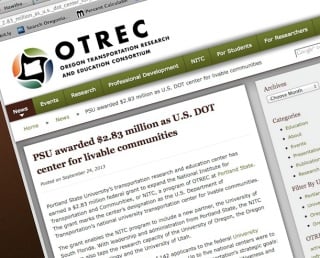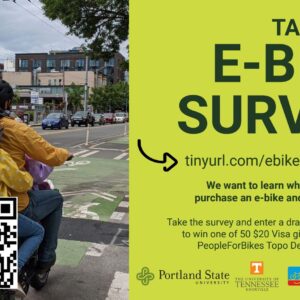
The Oregon Transportation Research and Education Consortium (OTREC) at Portland State University continued to raise its national profile with today’s announcement of a $2.83 million grant from the U.S. Department of Transportation. This grant comes on the heels of a $3.5 million federal grant awarded in January 2012 that solidified PSU’s role as one of the premier university transportation centers (UTCs) in the country. The competition for this grant was very stiff with 142 universities vying for just 32 grants.
With this latest grant, OTREC at PSU is now the USDOT’s go-to institution when it comes to “livable communities” research. For this round of grants, the USDOT awarded just five national university transportation centers. Each center was pegged to focus its research on one of the agency’s five categories: economic competitiveness, environmental sustainability, safety, state of good repair, and livable communities.
We asked OTREC’s Justin Carinci if he felt the livable communities designation would limit the scope of their work. “I don’t think it’s limiting,” he said, “because we always consider those other categories as being part of livable communities.”
When PSU won their initial federal grant in 2012, they created the National Institute for Transportation and Communities (NITC) to reflect the inclusion of their partner universities from outside the state. (Their partners are: the Oregon Institute of Technology, University of Oregon, University of South Florida, and University of Utah).
PSU and its partner universities have put out a call for research proposals for the coming year, but they’ve already committed to several areas of focus. Some of the projects that will be funded in the first year with this grant include:
- A project evaluating how transit-oriented developments affect jobs, housing choice and affordability; and another examining their equity effects in immigrant communities.
- A study providing designers and engineers the safety effects of splitting scarce right-of-way among various modes.
- A project looking at whether a fuel-cell drive can reduce emissions from large commercial vehicles such as garbage trucks.
As any regular readers of BikePortland are aware, the excellent and timely research being done at OTREC has a huge impact on transportation policies and debates. From e-bikes to busting myths about shopping behaviors — PSU continued success in the transportation research field is great for Portland and great for moving policy forward.
Congratulations!
— Read more about transportation research in our archives.







Thanks for reading.
BikePortland has served this community with independent community journalism since 2005. We rely on subscriptions from readers like you to survive. Your financial support is vital in keeping this valuable resource alive and well.
Please subscribe today to strengthen and expand our work.
Congrats to PSU & OTREC — this is a huge plus for them, and for bicycle planning research in Portland.
OTREC has been working with PBOT on all sorts of innovative bicycle infrastructure, providing the technical expertise and research staff/students to evaluate the new infrastructure.
Many of the new bike lane configurations, bike box treatments, and other non MUTCD compliant pavement markings have been evaluated and found to be successful by OTREC.
Having more research funds in town means more research, more advancement of bicycle projects, more bicycle researchers employed, and ultimately, a faster track to the bicycle-focused street designs that we need to bring a new level of comfort and safety to bicycle travel.
I’m looking forward to seeing the results of their endeavors,
Ted Buehler
I’ll save you 2.8 million dollars:
Make driving expensive and annoying and cycling and public transportation cheap and easy, and everybody wins. It’s the political will to stare down entrenched private interests that’s the hard part. Automobiles are a private interest, not a public one.
If funded academics spend the 2.8 million and don’t come to the same conclusion, I would be surprised.
“A project evaluating how transit-oriented developments affect jobs, housing choice and affordability; and another examining their equity effects in immigrant communities.”
Definitely interested in what this project’s findings are. Kinda think we have some idea already, but a grant this large should should help shine a much needed light on the discriminatory development/housing practices in this town.